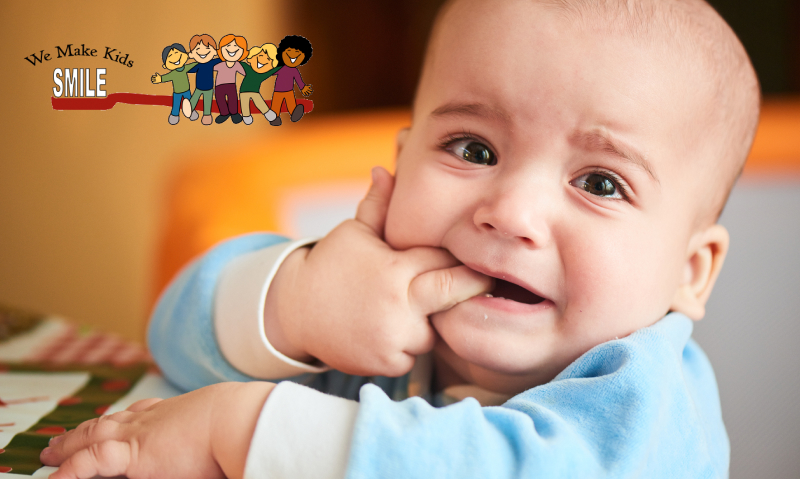Everything you need to know about teething.
The arrival of your baby’s first teeth is an exciting milestone for parents. Teething signifies that your baby is healthy and growing, soon moving past the infant stage toward toddlerhood.
Unfortunately, it isn’t so fun for babies as they go through this brief but uncomfortable teething stage. Some babies may hardly seem phased while others really have a tough time. Here’s what you should know about teething as a parent and 5 effective ways to keep your little one comfortable.
When do babies start teething?
Babies can begin teething anywhere between four and seven months, though some late bloomers may not start cutting teeth until later. As long as your baby is healthy and happy, delayed teething is generally nothing to worry about.
The order in which baby teeth come in first can also vary, but it typically begins with the front bottom teeth followed by the top teeth, and the molars. In total, your baby will have all 20 primary teeth by the time they are a few years old.
What are the usual symptoms of teething?
You’ll probably know your baby is showing signs of teething because they are acting fussy and seem to want to chew on things much more than usual. Most babies show multiple symptoms. Some of the most common teething symptoms include:
- Grumpiness and crying.
- Swollen or tender gums.
- A desire to chew on hard things.
- Drooling.
- Rubbing their face and ears.
- Trouble sleeping or a change of appetite.
These symptoms are all considered normal, but if you do suspect something is wrong, trust your instincts and call their pediatric dentist or pediatrician.
How can I soothe my teething baby?
Keeping your baby comfortable while teething is often a trial-and-error experience. Some babies respond well to teething rings while others do better with distraction through play. Experiment with different ideas, and remember, changing things up also keeps things interesting for your baby.
1. Gently massage their gums with a clean finger.
A gum massage can be very soothing and comforting for a teething baby. Wash your hands thoroughly and see if your baby will let you rub their gums. This might end up being more of your baby chewing on your finger, but it still works well. As an added bonus, it also helps your baby get used to future oral care as they get older.
2. Offer a teething cracker to chew on.
Hard teething crackers are great for babies who really want something a bit tougher to chew on. Teething crackers and similar teething snacks are safe and specifically designed for babies. Remember to always supervise them, just in case a cracker becomes soggy enough for a piece to break off.
3. Keep teething toys ready in the fridge.
Teething toys are a must! We recommend using plastic toys as the gel-filled variety has the potential to become punctured. Place teething toys in the refrigerator rather than the freezer, as a completely frozen toy may be too tough for your baby. If you need one quickly, placing it in the freezer just until it gets cold enough is safe too.
4. Freeze a clean wet rag for gentle chewing.
For babies who don’t seem to like regular teething toys, try freezing a clean wet rag instead. The softer texture and flexibility make it easier for your baby to chew on more of their gum surface compared to a solid ring toy.
5. Distract them with games or a movie.
Sometimes distraction is the best cure for a grumpy teething baby. Play a fun game, offer a new toy, or put on a movie to keep them engaged and not thinking about their sore gums.
Be very cautious of any teething remedies that rely on over-the-counter pain medications, topical pain-relieving gels, or herbal remedies. If you come across an idea that seems like it might work, give your baby’s pediatric dentist a call first to get the all-clear.
How should I care for my baby’s new teeth?
Keeping your baby’s gums and newly arriving teeth clean is important, both for preventing early tooth decay as well as helping them get used to dental care. You can clean gums and newly erupted baby teeth with a clean damp rag. Once a tooth fully erupts you can switch to a very soft toothbrush designed for infants and toddlers.
Book your baby’s first dental checkup by their first birthday.
Did you know that your baby should see a pediatric dentist as early as their first birthday?
The American Dental Association recommends parents book an appointment within six months of their first tooth erupting or by the age of one. Even though they may not have very many teeth yet, these early appointments help prevent future problems and give your child a chance to develop a trusting relationship with their pediatric dentist.
For gentle, experienced pediatric dental care in Waldorf or Prince Frederick, look no further than the We Make Kids Smile team. To book your baby’s checkup, call your preferred location or use this online form.
